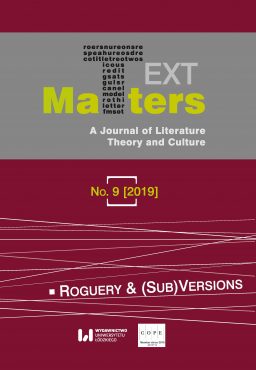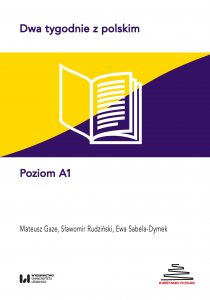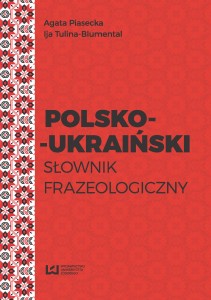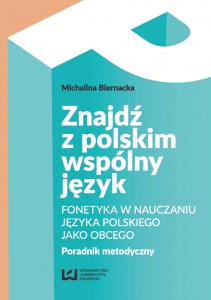Text Matters – Call for Papers
Opublikowano: 28 maja 2020

Redakcja czasopisma naukowego “Text Matters: A Journal of Literature, Theory and Culture” zaprasza do publikowania. Termin składania abstraktów upływa 31 lipca 2020 r.
Więcej informacji:
CALL FOR ARTICLES, REVIEWS, AND INTERVIEWS
From
TEXT MATTERS: A JOURNAL OF LITERATURE, THEORY AND CULTURE
Published by the University of Łódź in Poland
Editor-in-Chief
Dorota Filipczak
Special Themed Issue
LITERATURE AND SECURITY
Edited by
Liam Francis Gearon (University of Oxford)
and
Dorota Filipczak
EXTENDED DEADLINE
31 July 2020
In view of the pandemic present, the editors are now making a renewed call for articles for this ever-more timely special issue on Literature and Security to include pertinent themes from utopian and dystopian literature, either specific literary critiques of literary texts (for instance, Albert Camus’ The Plague, Patrick Deville’s Plague and Cholera) or popular novels across genre – detective, espionage, romance, science fiction, historical or contemporary fictions – and media (drama, film, theatre) where the personal, social and political confronts the eschatological, the apocalyptic, and existential threat.
CALL FOR PAPERS
In order to delineate this innovative field, there is here a more detailed than usual Call text – the text is here adapted and drawn from
Liam Francis Gearon (2019)
“A LANDSCAPE OF LIES IN THE LAND OF LETTERS:
The literary cartography of security and intelligence”
from his forthcoming:
Gearon (ed.) (October 2019) Routledge International Handbook of Universities, Security and Intelligence Studies
Literature is a lie which seeks to tell a truth. Espionage is a trade dependent on deceit. Where the two professions meet, the dissembling knows no limit. As David Cornwell, the non-de-plume of John le Carré (has written: ‘I’m a liar, born to lying, bred to it, trained to it by an industry that lies for a living, practised in it as a novelist’ (Kerridge, 2015). The curiously entangled relationship between literature, security and intelligence is, then, not surprisingly replete with twists and turns of plot and an odd array of dual-facing characters.
In the complex interplay of spy fact and spy fiction, many practitioners of the former have engaged in writing the latter. Eric Ambler, John Bingham, John Buchan, Ian Fleming, Graham Greene, John le Carré, Eliza Manningham Buller, Somerset Maugham and Arthur Ransome are well-known to the list (Burton, 2016; Hannabuss, 2016). And for writers of spy fiction who – except perhaps in their authorial dreams – were never spies, the real and imagined adventures and misadventures of actual spooks by necessity provide the storyline.
Look glancingly at the relationships between the factual worlds of the security and intelligence agencies – the spies – and their fictional representations and we see numerous ironies. Perhaps the most curious being that few seem wholeheartedly to believe governments who employ secret bands of men and women in the security agencies to uncover the truth, so that politicians can act on their intelligence, while many seem enthral to and are willing to suspend disbelief when reading novelists who are paid to lie.
Some spy writers have worked consciously to highlight actual as well as imagined security and intelligence concerns. A good example of where the real and imagined themselves are blended is in ‘the narrative threat of nations’, such as in classic stories of foreign invaders by Erskine Childers (The Riddle of the Sands) and William Le Queux (The Invasion of 1910). Others such as Ian Fleming create characters like James Bond who single-handedly save the free world from jeopardy, written by an author who had known active secret service in wartime naval intelligence (Harling, 2015).
Such authors, in turn, impact the world they represent. Le Queux, in particular, might be said to have been responsible for enhancing the milieu of threat which led to the formation of MI5 (Andrew, 2010, 2018). Others are by turns alarmed or flattered to see their own worlds of secrecy in the lie of fiction. The KGB and Politburo had strong views about the anti-Soviet propaganda of 007, strong enough to create a series of Soviet counter-fictions (Connick, 2017). For both John F. Kennedy and Lee Harvey Oswald, Ian Fleming allegedly provided the bedside reading the evening before the President’s assassination, part of a sphere of influence and intrigue that unites the reading public and political elites (Rakison, 2018). The importance of fiction to the genuine jeopardy of geopolitics was clear in an event marking the hundredth anniversary of the birth (in 1908) of an author who lived until only the age of 56, an Imperial War Museum exhibition on the fictional Bond and the real-life Fleming (Burns, 2008). Some intelligence agencies are systematic in their attempts to comment on writing of all sorts that centres on security. Their interests extend to academic analyses of real-life geopolitical contexts as well as the fictional constructions of prose; the Federal Bureau of Investigation’s (FBI) interest in the narratives of power made by the American sociologist C. Wright Mills is a good exemplar (Alarcón, 2017). The Church Committee had similarly identified widespread security and interest of the Central Intelligence Agency (CIA) and FBI on campus, both within and far beyond the borders of the United States (Church Committee, 1975, 1976). The CIA, for its part, with its own self-declared ‘University’, has long published an ‘Intelligence Officer’s Bookshelf ’to review literature of relevance to the agency (CIA, 2019).
From whatever perspective we look, the interface between literature, security and intelligence is rarely incidental. In many cases, books, like other forms of media, have been used as a direct part of ideological and intelligence apparatus, particularly in the history of propaganda, and it is the literary collective as much as particular literary and academic authors who are subjects of security interest, whether the protection of states or political doctrine (Chomsky, 2008; Herman and Chomsky, 1995; Johnson and Parta, 2014; Kind-Kovacs, 2014; Nelson, 2003; Parnica, 2016; Wilkinson, 2009). Books and their authors are often therefore an integral part of the targeted action as perceived physical or ideological threat. Nazi Germany, the Soviet Union and Maoist China are important cases here. Indeed, dictatorial regimes the world over have long targeted authors alongside intellectuals who are the first threats to be eliminated or undermined, either through cultural and social exclusion through censorship and imprisonment or through the expedients of execution (Power, 2010). Read, for instance, the chilling double-entendre of Bytwek’s (2004) Bending Spines for an account of how a synthesis of books and brutality were at the root of Nazi and other forms of totalitarianism.
To a lesser extent and often more subtly (or covertly), such methods of cultural influence have not been unknown in western democratic states too (Miller Harris, 2016; Reisch, 2013; Risso, 2014; Rockhill, 2014, 2017; Stonor Saunders, 2013; Whitney, 2018; Wilford, 2003, 2009). Literature might here be considered an element of what Nye (2004) conceptualised as ‘soft power’ or the cultural and diplomatic means of influence (Chitty, Ji, Rawnsley and Hayden, 2016). The coordinated use of both soft and hard power is required to effect geopolitical dominance (Coll, 2017; Prados, 2006; Weiner, 2012a, 2012b). While propaganda itself can itself be considered a weapon of war, books and bombshells often share then the same ideological trajectory, one reinforcing or even anticipating the other, most particularly during times of war (Bernays, 2004; Cooke, 2014; Welch, 2015, 2016). It is why Taylor (2003) calls propaganda the ‘munitions of the mind’, and O’Shaughnessy (2005) defines it as a ‘weapon of mass seduction’. The cultural always forms a backdrop to conflict (also O’Shaughnessy, 2017, 2018).
Through authorial production, geopolitical impact and academic commentary, literature here permeates the fictionalised and the factual. Beyond mere propaganda, where the lies and truths of literature have perceived influence over peoples, authors and their writings, they have become integral to colonial and postcolonial narratives and counter-narratives (Arnold, 2009; Bhabha, 2004; Césaire, 2000; Fanon, 2001; Foucault, 2009, 2010; Mishra and Hodge, 2005; Said, 1994; Spivak, 2003, 2012; Thiong’o, 2011). Today, these narratives still matter and can be seen as part of a more subtle (if no less pervasive) sphere of security and intelligence influence into the world of letters, the arts and through these to the Academy (Albert and Buzan, 2011; Bagge Laustsen and Wæver, 2000; Buzan, Waever and de Wilde, 1998; Buzan and Hansen, 2009; also Albert and Buzan, 2011; Buzan and Hansen, 2009; Dunn Cavelty and Balzacq, 2016; Hough, 2014; Stritzel, 2007). The diversification of security and intelligence domains into the cultural and the world of letters make it therefore an integral part of wider ideological and political struggles. Modern security and intelligence theorists have long-known that books – and in the widest sense, narrative – can subvert governments or uphold them, defend or embolden beliefs and values, or further their collapse (Berger, 2016; Croft and Moore, 2010; Glazzard, 2017; Karolides, Bald and Sova, 2011). The twentieth century was the era, however, when such means of cultural persuasion came of age (Welch, 2015). It was, not surprisingly, when security and intelligence agencies also came of age (Aldrich, 2010; Andrew, 2010, 2018; Jeffery, 2011; Weiner, 2012a, 2012b). In no small measure due to the emergence, too, of the means of mass communication for the purposes of persuasion, lesser told is the story of the many organised, strategic encounters of literature and culture with the sources of security, intelligence and power.
The Special Issue is a call for scholars from a range of literary backgrounds with interests in the political, security and intelligence dimensions of literature to contribute to a ground-breaking collection on Literature and Security.
Please send proposals (with the subject line, PROPOSAL, TEXT MATTERS) of no more than 400 words to:
liam.gearon@education.ox.ac.uk and text.matters@uni.lodz.pl
Deadline for proposals: 31 July 2020
Deadline for final essays: 30 September 2020
Deadline for revisions of essays: 28 February 2021
Word limit for final essays: 3,000–5,000
Komentarze
Ten post dostępny jest także w języku: angielski





